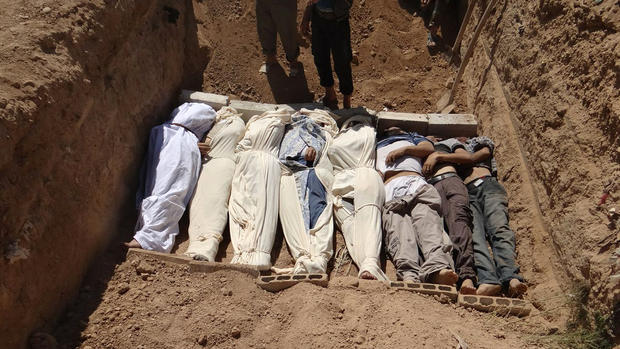U.N. inspectors return to Syria to probe chemical weapons claims
Updated at 5:37 a.m. Eastern
A team of U.N. chemical weapons inspectors returned Wednesday to the Syrian capital of Damascus to complete their investigation into "pending credible allegations" of chemical weapons use in Syria's civil war.
A report following the inspectors' previous trip said the nerve agent sarin was used in an August attack near Damascus.
The team spent three days at the beginning of September gathering evidence in Damascus' eastern Ghouta suburbs after that attack, and and published a report which the U.S. and its allies called conclusive proof that Assad's regime was behind the attack. Russia dismissed the report as "politicized, preconceived and one-sided."
The White House has said the attack killed 1,400 people, while activist groups have given significantly lower death tolls, but still in the hundreds.
The other sites, one of which is the town of Khan al-Assal outside the northern city of Aleppo, were meant to have been the focus of the inspection team's first mission to Syria, but they were in the country when the Ghouta attack occurred and quickly changed their mandate to assess the fresher evidence at hand.
Russia and Syria have argued that the U.S. and its allies jumped to quickly to their conclusions that Assad's military was behind the Ghouta attack, and that evidence from the other alleged chemical weapons incidents -- all of which have been smaller -- will support their claim that rebel fighters do have access to and the ability to use lethal toxins, including sarin gas.
Meanwhile, the top U.S. and Russian diplomats met Tuesday at U.N. headquarters in hopes of working out the details of a deal to have Syria give up its chemical weapons -- a deal which, for the time being, has staved off the threat of an imminent U.S. military strike.
CBS News correspondent Margaret Brennan said there's been very little progress since the framework of the deal was agreed by Secretary of State John Kerry and his Russian counterpart Sergey Lavrov in Geneva almost two weeks ago. The U.N. meeting ran nearly two hours and there was a lot to discuss.
Kerry and Lavrov arrived for the meeting with sharp differences over the terms of the deal and how to enforce it. Hours before the men met, Lavrov's deputy told Russian lawmakers in Moscow that negotiations on the U.N. resolution to lay out the details of the deal were "not going so smoothly."
"Unfortunately it's necessary to note that in contacts with the Americans, things are not going so smoothly ... they are not quite going in the direction they should," said Deputy Foreign Minister Sergei Ryabkov.
The Obama administration has called Russia's public statements since the initial Geneva meeting counterproductive.
